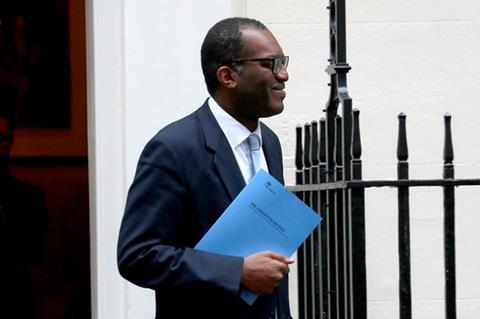Rumours surfaced that legislation was to be binned after new planning and infrastructure bill announced on Friday
The housing department has insisted it will press ahead with reforms in the existing Levelling Up and Regeneration Bill despite the announcement on Friday of a new Planning and Infrastructure Bill in chancellor Kwasi Kwarteng’s mini budget.
There were growing industry rumours last week that the Department of Levelling Up, Housing and Communities (DLUHC) was set to the scrap the Levelling Up and Regeneration Bill (LURB), which contains a raft of planning reforms such as the creation of a new Infrastructure Levy, following an unexpected decision to delay progress of the Bill in committee.
Then on Friday the chancellor’s Growth Plan announced new legislation to further reform planning by reducing the burden of environmental assessments and reforming habitats and species regulations in a new Planning and Infrastructure Bill.

Industry sources said it appeared unlikely the government would bring forward two separate planning reform bills at the same time, but a spokesperson for the department insisted it will continue with the LURB.
A DLUHC spokesperson said: “We remain focused on levelling up and are continuing to progress the bill.”
A committee of MPs considering the bill, which wraps up the planning and levelling up reforms drawn up by previous housing secretary Michael Gove, had been expected to sit on 13 September and produce a report on its progress last week. But this sitting has now been adjourned until 13 October, with industry insiders still expecting the bill to be pulled.
The response from the department comes after doubts were raised about the future of the proposals. One senior housebuilding industry figure had said on Friday: “It feels inevitable with the new investment zones agenda that the levelling up bill will be ditched at some point.”
In addition to implementing the conclusions of the Levelling Up white paper, the Bill also contained the remnants of planning reforms first aired in the controversial 2020 Planning for the Future white paper. The Bill contains proposals for a new Infrastructure Levy, reforms to planning enforcement, to scrap the Duty to Co-operate between authorities, and to scrap the requirement for local authorities with up to date plans to demonstrate a five year supply of land.
It also contains plans for a suite of national development management policies which would trump local plan policies.
The proposed Planning and Infrastructure Bill, in contrast, is designed to reduce the burden of environmental assessments, reduce bureaucracy in the consultation process, reform habitats and species regulations, and increase flexibility to make changes to infrastructure permissions once they have been submitted.
Guidance issued this weekend said the proposals for new Investment Zones will likely require “primary legislation” to deliver “simplified regulations”. However, it did not make clear what the legislative vehicle for that new law will be.




























No comments yet